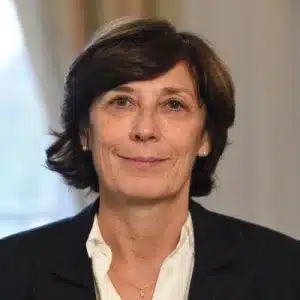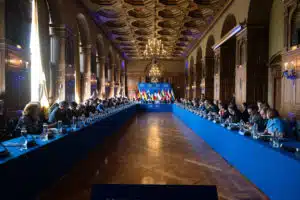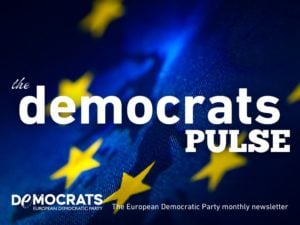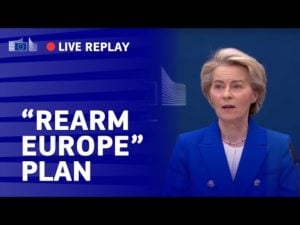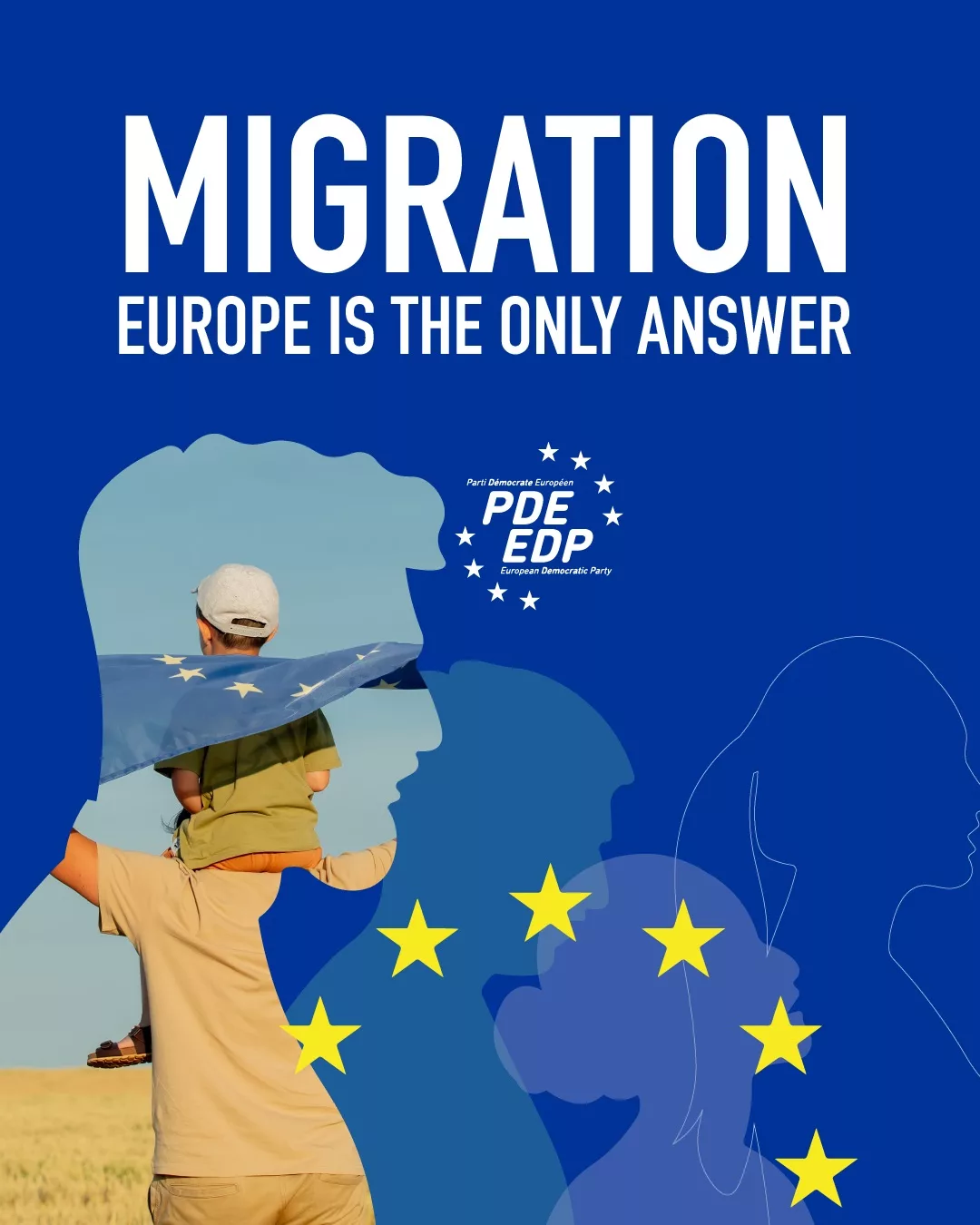The European Democratic Party returned to Guidel, France, on 23-25 September 2022 for its annual “Europe Days”. The three-day event focused on European politics in this Breton seaside town, including 10 hard-hitting workshops and two plenary sessions. The EDP Europe Days were held in parallel with the “Université de rentrée”, an annual event organised by the Mouvement Démocrate – the EDP member party in France.
Policymakers and experts discuss Europe’s approach to the war in Ukraine and relations with China in plenary sessions.
The event included two plenary sessions that brought together some 500 participants in the MoDem’s ‘rentrée politique’ and the EDP ‘European Days’. The first plenary explored EU policy responses to an unstable and multipolar world. The first plenary proposed a “masterclass” in geopolitics to better understand the new world order and its grey areas. A panel moderated by MEP Laurence Farreng (EDP and MoDem, France) brought together Jean-Louis Bourlanges, President of the Foreign Affairs Committee of the French National Assembly; Jean-Yves Le Drian, former French Minister of Foreign Affairs; Oxana Melnychuk, analyst and strategic communicator; and Marie-Pierre Vedrenne, MEP (EDP and Modem, France).
Oxana Melnychuk , a native of Ukraine, began the session by expressing her country’s aspiration for a free, fair and democratic future: “For us, the words ‘freedom, equality, fraternity’ also speak to us.” Regarding the war in her country, she said, “Putin lost the war from the very first days, as soon as European solidarity with Ukraine appeared.”
Jean-Yves Le Drian warned: “This crisis in Ukraine will be long. And I want to say it here: it is the Ukrainians who will have to set the terms of the negotiations. Vladimir Putin has multiplied and accumulated underestimations about Ukraine, as well as about the strength of the Ukrainian nation, Europe’s responsiveness, the consequences for NATO, and finally the state of its army.”
He added: “We share the fact that the future of Europe remains open, especially on defense in Europe. We have made progress in an unimaginable way, and this is a hope in this very messy, complex and conflicting universe.” Melnychuk replied to Le Drian, saying: “The issue of security and defense in Europe can no longer be done without Ukrainians. Because unfortunately, Ukraine is experiencing war today.”
Jean-Louis Bourlanges gave a historical overview of the foundations of the European project and border conflicts, stating: “The European Union was originally built for peace, not for war. It was built to soften borders, not to defend them.
MEP Marie-Pierre Vedrenne shifted the focus of the debate to China, where negotiations with China and the European Union have moved in Europe’s direction, saying, “What can move China is access to our domestic market. She added: “When Lithuania tried to resist China, China used economic pressure. That is why we are working on anti-coercion measures.” Marie-Pierre Vedrenne also spoke about the role of the democratically elected European Parliament in the political debate on foreign policy: “It is our role as European parliamentarians to give substance to strategic autonomy so that the European Union decides when, how and with whom it wants to trade.
💬 “This crisis in Ukraine 🇺🇦will be long.
— European Democrats (@PDE_EDP) September 24, 2022
"And I want to say it here: it is the Ukrainians who will have to set the conditions for the negotiation."
- @JY_LeDrian, former French minister of foreign affairs, speaking today at 'Europe' plenary.
🇪🇺 #Guidel2022 #ListenLead pic.twitter.com/7rMiIqlsVq
Second Plenary Session: Democracy must resist extremes
The second plenary followed with remarks by Stéphane Séjourné, president of the Renew Europe group in the European Parliament who also serves as secretary general of Renaissance, a French centrist and pro-European political party. He contrasted his party’s call to come ‘together’ with the movement towards the extremes seen in the recent Italian elections. He remarked: “The gathering ‘Together’ is not an empty word. I say this all the more because the opponents of our gatherings will probably still be the extremes as we see in Europe.”
Stéphane Séjourné was preceded by a brief intervention by the president of the EDP, François Bayrou, who is also the leader of the Mouvement Démocrate party. He gave his analysis of the first panel, stating: “We have always considered that the watchword within the majority was the alliance. The alliance passes through mutual esteem, solidarity and freedom of expression.”
Edouard Philippe, mayor of Le Havre, Normandy, and former Prime Minister of France as well as President of Horizons, the third party of the presidential majority in France, spoke after Stéphane Séjourné’s speech. Edouard Philippe highlighted the changing perception of Western democracy around the world, saying, “Many people have the impression that Western democracy is no longer the right model for our society and that it would not provide the necessary answers. This idea is extremely dangerous and powerful.”
Europe on the brink of a nervous breakdown
More than 300 people participated in the 10 EDP workshops, which brought together experts, policymakers and activists to address policy issues affecting Europe. Workshop participants addressed policy challenges in an unstable world that is transforming into a multi-polar world. The Friday evening kick-off was under the theme: “Europe on the verge of a nervous breakdown”. Edouard Gaudot and Alexandra Leuliette, experts in European affairs, participated in the roundtable and exchanged ideas on the future economic model, while analysing concepts such as “sobriety”, linear or circular economy, and the EU decision-making process.
Edouard Gaudot noted: “Europe is a set of actors, Brussels is not unique. The decision is the result of a process in which multiple actors participate. On international markets, he noted, “The standards of the European Common Market have been turned upside down by outsourcing abroad.”
The panel also addressed the themes of youth and society, where Alexandra Leuliette noted: “Young people are increasingly involved in transnational politics. Whether it is climate marches or LGBT rights for example. She also advocated for the need for electoral reform in Europe, stating, “More than ever, we must fight for transnational lists.”
« L’Europe c’est une collection d’acteurs. Bruxelles n’est pas unique, la décision résulte d’un processus avec de multiples acteurs impliqués. » dit@EGaudot #Guidel2022🇪🇺 pic.twitter.com/Ei4WD6IaDD
— European Democrats (@PDE_EDP) September 23, 2022
Managing peace: A European approach to conflict
EDP Deputy Secretary General Frédéric Petit joined Sorbonne University professor Laurent Warlouzet for a conference on how best to manage peace in Europe.
Frédéric Petit, French national parliamentarian representing the French located in Germany, Central Europe and the Balkans, speaking on the war in Ukraine, explained: “The war has brought Ukrainians together around their nation, but also around their democratic institutions. The Ukrainian Parliament is working more than ever.
“Conflict must be managed. Europe applies a humanistic management of conflicts, to face global challenges. And it is this model that is under attack in Ukraine.”
Laurent Warlouzet focused on military policy in Europe, describing the current state of military cooperation: “There is a gap between institutional Europe and the will to power. The new strategic compass allows us to move forward, but we are still far from the mark.”
💬 " La guerre a rassemblé les Ukrainiens 🇺🇦autour de leur nation, mais aussi autour de leurs institutions démocratiques. La #Rada (le Parlement Ukrainien) travaille plus que jamais. "
— European Democrats (@PDE_EDP) September 24, 2022
- @fpetitAN pendant l'atelier sur la gestion de la paix en Europe
🇪🇺 #Guidel2022 #ukraine pic.twitter.com/qDo2qzMUZa
2022: European Year of Youth
A panel on the European Year of Youth 2022 explored how policies should be conducted with young people in mind. The European Year of Youth provides a springboard for a broader discussion on the needs of young people, especially in these uncertain times.
💬 " Nous poussons pour étendre l'Année européenne de la jeunesse à 2023. La jeunesse doit continuer à être au cœur de nos politiques "
— European Democrats (@PDE_EDP) September 24, 2022
- @laurencefarreng
🇪🇺 #Guidel2022 #EYY2022 pic.twitter.com/iIUuk0AOdK
Led by Laurence Farreng, a French European parliamentarian, and Ugo Rostaing, Secretary General of the Young European Democrats (YDE), this one-hour round table presented the role of the YDE.
Rostaing said: “Making proposals on behalf of European youth is part of our mission in the Young Democrats.”
Farreng added: “We are lobbying for the European Year of Youth to be extended until 2023. Youth must continue to be at the heart of our policies.”
Frontières grises en Europe
In the fourth panel, Frédéric Petit joined Cercle Agénor President Pierre-André Hervé to address the issue of “gray zones” in Europe. Present in Baltic countries such as Estonia, the zones are applied to areas bordering Russia. Hervé observed: “There is a model that wants clear borders – that of cooperative countries – and another model that calls for grey borders. Russian imperialism, for example… Imperialism needs grey areas. The inviolability of borders is crucial and must be defended, in Ukraine and elsewhere.”
He adds that the border is not a wall, nor is it a line. “A border defines responsibility as a citizen… We need to move away from a narrow view of the border. It does not define a language, a culture, or a population – a simplistic view often used by sovereigntists.”
Agenor Circle president explored the EU model based on international reconciliation, calling it a “unique model” that began with the reconciliation between France and Germany.
💬 " Le modèle de l'Union Européenne est celui de réconciliations internationales. En commençant par la réconciliation entre la France 🇫🇷et l’Allemagne🇩🇪. C’est un modèle inédit. "
— European Democrats (@PDE_EDP) September 24, 2022
- @paherve,@ l'atelier " les confins de l’Europe : frontières ou zones grises ? "
🇪🇺 #Guidel2022 pic.twitter.com/D9mRZIA94K
War in Ukraine and the energy crisis
Christophe Grudler, Member of the European Parliament, joined Sylvain Waserman, former Vice President of the French National Assembly, to discuss the war in Ukraine. The session examined how the European Union can organise itself to respond to the energy crisis.
Grudler, a member of the ITRE – Committee on Industry, Research and Energy – noted that the emerging energy crisis actually began before the war in Ukraine. He added that the energy crisis was “greatly accelerated by the war, which showed the limits of our energy import model.” He also called for more energy production with the European Union, so that it can have its ‘energy destiny’ in hand.
Sylvain Waserman explored the energy markets, saying, “When these markets behave in a completely crazy way – as is the case now – it is normal for the state to act. And in this case, the European Union is helping member states get their act together.”
Trade policy
A panel on trade policy followed, covering EU efforts with its trading partners around the world. The session focused on a host of related issues, including around digital policy to deal with large U.S. tech giants, as well as tax avoidance schemes in tax havens inside and outside the EU. Participants posed questions to EU parliamentarian Vedrenne, a Breton and co-chair of the Europe Together delegation to the European Parliament. She was joined by Charles de Marcilly, political administrator at the General Secretariat of the Council of the European Union, who also answered questions from the captivated audience.
The major social issues raised by international climate challenge
Yannick Mireur, founder of the Nexus Forum, shared a panel with MEP Sylvie Brunet, vice president of the Renew group in the European Parliament.
Sylvie Brunet conveyed to a room full of committed MoDem members the message that the European Union wants to help workers in the transitions on the ecological and digital fronts. For example, in the field of transport, the upheavals caused by battery electric cars pose new challenges for workers in the automotive industry. She said, “Manufacturing an electric car does not require the same skills as manufacturing an internal combustion engine (ICE) car.” In a similar vein, she noted that the European Parliament recently voted in favor of legislative efforts regarding the Social Climate Fund. She said, “This will really help EU workers when transitions in their sectors occur. She then concluded on a reassuring note: “In the face of climate change, the European Union has its part to play in supporting its citizens and leaving no one behind.”
💬 "The European Union wants to help workers 👩🔧 in the ecological and digital transitions.
— European Democrats (@PDE_EDP) September 24, 2022
"Making an electric car does not require the same skills as a ICE car. "
- @syl_brunet, MEP (France) speaking at the EDP workshop on big social challenges ahead.
🇪🇺 #Guidel2022 pic.twitter.com/SCtZuWYN3p
In the middle of the afternoon, the EDP parliamentarians elected in France organised a special workshop to answer questions about the Europe Days. Sylvie Brunet, Laurence Farreng and Marie-Pierre Vedrenne, along with Max Orville, Christophe Grudler and EDP Secretary General Sandro Gozi spent an hour discussing the work of each parliamentarian with participants. Laurence Farreng spoke about the conference on the future of the European Union, saying: “Last year’s conference was about the future of Europe, with 800 citizens drawn by lot from all over the European Union. This conference could lead to a revision of the European treaties. We have asked for this”.
MEP Marie-Pierre Vedrenne explained her work in the Committee on International Trade by saying: “I push to include European strategic autonomy in our work. And here too, we succeeded during the French Presidency of the European Union! For example, on reciprocity in public procurement.”
In his remarks, Christophe Grudler emphasized areas such as space policy: “Strengthening EU autonomy in space is one of my priorities. The new efforts on ‘connectivity’ satellites, on which I am rapporteur, will contribute directly to this!”
MEP Max Orville, vice chair of the ACP-EU Joint Parliamentary Assembly (DACP) delegation, highlighted the policies affecting members of the Organization of African, Caribbean and Pacific States (OACPS).
Orville said: “We cannot apply the same rules on the continent to countries in the outermost regions – located thousands of kilometers away. This is also the reason why I am committed: to take into account at the EU level the particular aspects of these countries.”
Sandro Gozi closed the event looking the big picture: “Democracy is in crisis throughout Europe. This is because democracy requires time for debate while we need faster decisions in an instantaneous world. He stressed: “More than ever, we want to strengthen European democracy, and the role of European parties. With real transnational political movements.”
#Guidel2022
— Max Orville (@max_orville) September 24, 2022
Rendre compte, nous nous y étions engagés : quel plaisir de me joindre, pour la première fois depuis 2019, à @laurencefarreng @GrudlerCh @MariePierreV @syl_brunet en tant que député 🇪🇺 @PDE_EDP pic.twitter.com/4AFvu51nVb
Africa’s relations with the European Union: Questions and answers
A penultimate panel brought together MEP Max Orville and Albert Nsengiyumva, Executive Secretary of the Association for the Development of Education in Africa. Under the theme “Building a fair and solid relationship between the Union and Africa”, Max Orville asked pressing questions to policy makers: “Europe is asking itself about its relationship with Africa. What relationship does Africa want with Europe? What cooperation can we do together? There is a need for clarification. Albert Nsengiyumva concluded, “Africa needs to reinvent itself, and Europe can help it to develop on its own.”
#Guidel2022
— Max Orville (@max_orville) September 24, 2022
Construire une relation durable et apaisée avec l’Afrique, c’est le thème de nos échanges de ce soir avec @NSENGIYUMVAAlbe, secrétaire exécutif de l’@ADEAnet et ancien Ministre du Rwanda. pic.twitter.com/yFJMdZoXpZ
TV series “Parliament” screened
The last panel of the Europe Days was the occasion for the screening of the first episode of the TV series “Parlement”. Produced by France Télévision and available in streaming, it tells the story of Samy, a young parliamentary assistant at the European Parliament. Freshly hired, he knows little about the European institutions, but hopes to get by by playing the charm card. MEP Laurence Farreng organised the screening of this witty and humorous comedy.
She introduced the series, explaining that this type of production is an effective way to introduce European citizens to the European institutions. Designed as a TV comedy, the series takes viewers into the world of European politics and explains in detail how the European Parliament and other European institutions work.
EDP awareness efforts in September
The event in France was the second outreach event organized by the European Democratic Party in September. Earlier in the month, the EDP organized its “Zukunftsmacher Europa” in Frankfurt, Germany. Around 100 guests from the Freie Wähler, an EDP member party, attended on September 8 and 9 to exchange ideas on topics such as climate protection, digitalization and inflation. The participants, ranging in age from 16 to 81 and coming from all regions of Germany, included young people, students, working-age adults and retirees. For the EDP, it was an opportunity to listen to what citizens want from their government, now and in the future. The events in France and Germany are examples of the EDP’s citizen-centered political education and outreach.






